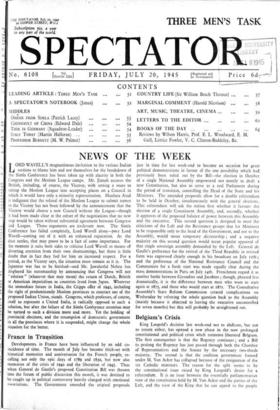France in Tragsition
Developments in France have been influenced by an odd co- incidence of time. The month of July has become thick-set with historical memories and anniversaries for the French people, re- calling not only the epic days of 1789 and 1830, but now also memories of the crisis of 1940 and the liberation of 1945. Thus when General de Gaulle's proposed Constitution Bill was thrown into the forum of public discussion this month, it was destined to be caught up in political controversy heavily charged with emotional
associations. The Government amended the original proposals
just in time for last week-end to become an occasion for great political demonstrations in favour of the one possibility which had previously been ruled out by the Bill—the election in October of a single National Assembly empowered not merely to draft a new Constitution, but also to serve as a real Parliament during the period of transition, controlling the Head of the State and his Ministers. The amended proposals allow for a double referendum to be held in October, simultaneously with the general elections. This referendum will ask the nation first whether it favours the election of a single Constituent Assembly, and, secondly, whether it approves of the proposed balance of power between this Assembly and the executive. This second question is designed to meet the criticisms of the Left and the Resistance groups that for Ministers to be responsible only to the head of the Government, and not to the Assembly, would mean temporary dictatorship ; and a negative majority on this second question would mean popular approval of that single sovereign assembly demanded by the Left. General de Gaulle's preference for the revival of the Third Republic in revised form was expressed clearly enough in his broadcast on July 12th ; and the preference of the National Resistance Council and the Communists for a fresh start was made equally clear during the mass demonstrations in Paris on July 14th. Frenchmen regard it as another battle between Girondins and Jacobins ; though, phrased less dramatically, it is the difference between men who want to start again at 1875, and those who would start at 1871. The Consultative Assembly's State Reform Commission created complications on Wednesday by referring the whole question back to the Assembly (mainly because it objected to leaving the executive uncontrolled for seven months) but this will probably be straightened out.


























